Gender and Inclusion
Gender, age, abilities and other individual or context-specific characteristics present different opportunities and challenges to provide CVA to people in crisis in a dignified manner.
Among humanitarian actors, there is an increasing acknowledgement of the specific needs and constraints of people of differing abilities, older people, people of different genders, particularly women, and people on the move. Alongside this is a growing appreciation of the need for tailored and sensitive measures that ensure their effective inclusion.
Supporting the needs of diverse people with CVA goes beyond making them a target group; it is about meaningful engagement, purposive design and implementation, and programme adjustment to meet different groups’ needs with dignity. Inclusive approaches go hand in hand with people-centred aid.
Current priorities
The CALP Network will continue to encourage cash actors to widen their focus to be more inclusive and champion a fuller understanding of how CVA can go beyond the notion of ‘do no harm’ towards appropriately addressing the needs of diverse people in safe and dignified manners.
We will work to elevate the experiences and initiatives on CVA and gender, disability inclusive CVA, working with different ethnicities and cultural identities, minority groups, people with diverse sexual identities, and age groups.
CALP will also strive to make its work as accessible as possible.
Featured content

Collected Papers on Gender and Cash Transfer Programmes in Humanitarian Contexts
Report
Existing gender inequalities mean that disasters and conflicts impact women, men, girls and boys differently. Cash based assistance is one of the most significant developments in humanitarian assistance in recent years. But the relationship between gender and cash based assistance in humanitarian contexts is poorly understood. All too often, interventions are designed based on assumptions...

Microlearning video: CVA and Gender
Blog Post
This video provides an overview of the relationship between gender and cash and voucher assistance (CVA) structured around the humanitarian project cycle, which include: Assessment and response analysis: How to adjust the assessment processes to achieve a more accurate reflection of gender and markets. Design and implementation: How to use methods and protocols to reduce the potential...

Better Gender Outcomes in Food Assistance through Complementary and Multi-Modal Programing: Promising Practices Tip Sheet
Guidelines and Tools
This Tip Sheet is excerpted from the research report, “Better Gender Outcomes in Food Assistance through Complementary and Multi-Modal programming,” and gives promising practices by the cycles of project cycle management, as well as at the response level. Additionally, there are expert tips and wisdom practices that support the use of a gendered approach in development or humanitarian...

Cash & Voucher Assistance and Gender-Based Violence Compendium
Guidelines and Tools
The Compendium is intended as a companion to the 2015 Inter-Agency Standing Committee (IASC) Guidelines for Integrating Gender-Based Violence Interventions in Humanitarian Action and its companion resource, the GBV Pocket Guide. The guidance was developed through the efforts of 15 organizations who contributed expertise in the inception, design and review of the document. The process was led...
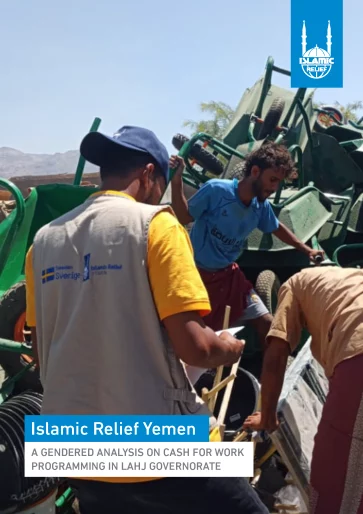
A Gendered Analysis on Cash for Work Programming in Lahj Governorate
Case Study
Cash for Work (CFW) programmes are designed to help the most vulnerable people meet their essential and basic needs. In Yemen, CFW interventions are responding to an ever-growing proportion of the Yemeni population that are in need of humanitarian assistance. Working with communities in the targeted areas of Hudayda and Lahj, the Swedish International Development Cooperation Agency SIDA-funded...
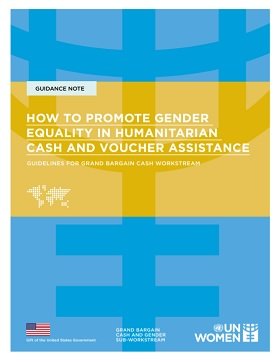
How to Promote Gender Equality in Humanitarian Cash and Voucher Assistance
Guidelines and Tools
The use of cash and voucher assistance (CVA) in humanitarian action is increasing rapidly.
With this rise, there is also growing demand by stakeholders to ensure CVA is more gender-responsive, addressing gender gaps and moving towards greater gender equality.
Gender-responsive CVA, which recognizes existing disparities and addresses the needs of all crisis-affected people equally, has the...
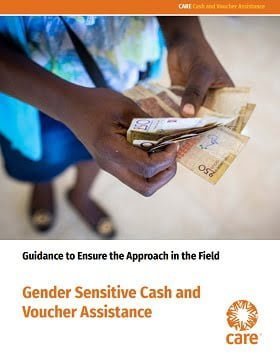
Gender-Sensitive Cash and Voucher Assistance: Guidance to ensure the approach in the field
Guidelines and Tools
This guidance builds on CARE’s ambition-via practice, research, evidence on CVA–and aims to support the application of gender sensitive CVA throughout the project cycle and at the response level. It is divided into two sections: – Part A: ‘What has been learned about gender sensitive CVA?,’ briefly explains the recommendations that came from the research. – Part B: ‘How do we...

Enablers and Gaps: Gender Equality, Gender-Based Violence Response and Mitigation in Cash and Voucher Assistance at Response levels: analysis on three case studies
Report
The Gender and Cash Sub-Workstream identified three case studies that illustrate how Cash Working Groups, GBV Sub-Clusters, gender focal points (e.g. Gender in Humanitarian Action Working groups at country and regional level) and humanitarian partnerships can enable meaningful and wider engagement on gender equity and GBV response in CVA. The case studies all show different aspects of linking...

How to mitigate gender-based violence (GBV) risks in cash and voucher assistance (CVA)
Video
Cash and voucher assistance (CVA) is an important tool to help individuals affected by crises get back on their feet. But just like any other form of assistance, it is vital to ensure that it does not fuel tensions in the household or in the community and that it does not create new risks for women and girls. Fortunately, there are a variety of ways that cash actors can work to mitigate risks...

Inclusive Information Systems for Social Protection: Intentionally Integrating Gender and Disability
Policy paper
Digital information systems serving the social protection sector, and especially social assistance, are increasingly prominent and will continue to be, as is the case within all other sectors. “Why? Because the ability of a country to care for its people and respond to their lifecycle needs depends on its ability to identify those who are in need, enroll them, provide tailored benefits and...
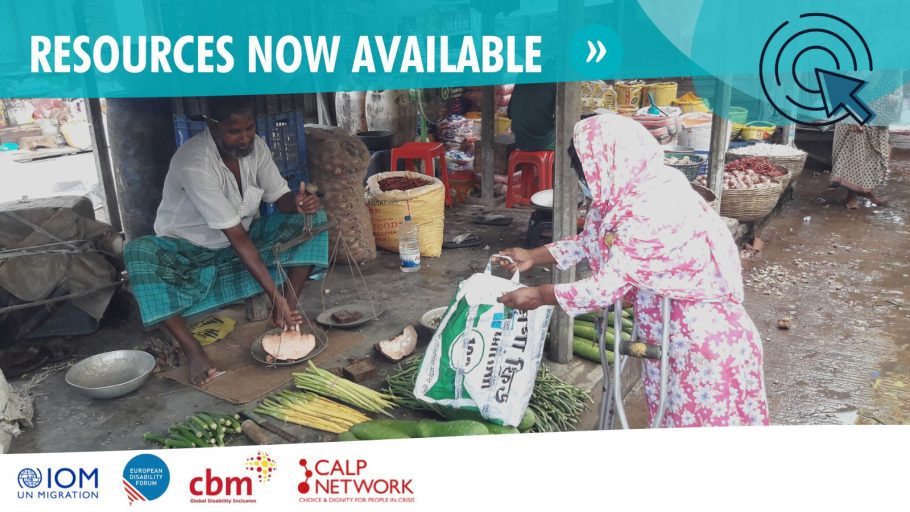
Mainstreaming disability inclusion into humanitarian CVA
Presentation
What is a rights-based approach to disability? How can disability inclusion be mainstreamed to ensure more inclusive and effective CVA humanitarian responses? To answer these key questions, CALP, CBM Global, European Disability Forum and International Organization for Migration (IOM), came together to organize the webinar “Mainstreaming disability inclusion into humanitarian CVA”, with the...
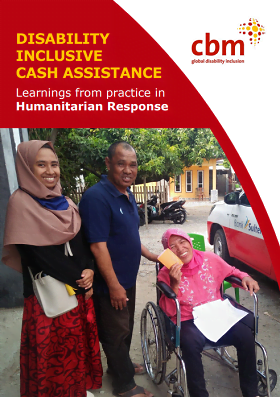
Disability Inclusive Cash Assistance: Learnings from Practice in Humanitarian Response
Guidelines and Tools
This case study collection describes lessons learned from seven inclusive humanitarian cash transfer projects implemented from 2015 – 2020 in Niger, Zimbabwe, Pakistan, Bangladesh, Philippines, and Indonesia, and five ongoing projects from the 2020 Covid-19 pandemic responses. This good practice collection aims to benefit both humanitarian practitioners engaged in Cash Based Interventions...
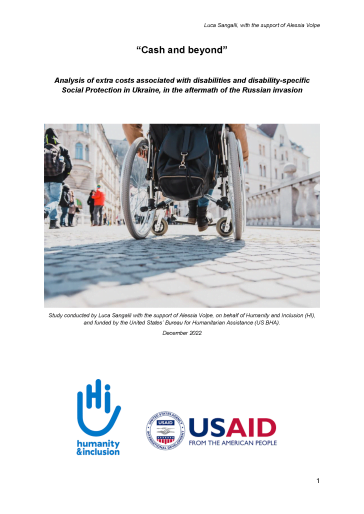
Cash and beyond – Analysis of extra costs associated with disabilities and disability-specific social protection in Ukraine, in the aftermath of the Russian invasion
Report
Following the escalation of the conflict in Ukraine in February 2022 and the consequent humanitarian crisis, the country has experienced active fighting and massive displacement, both within and outside its borders. Persons with disabilities and older persons have been facing particularly harsh effects, especially for those with more severe forms of disabilities, who encountered challenges in...
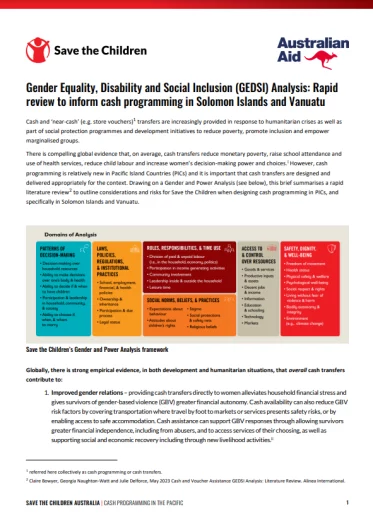
Gender Equality, Disability and Social Inclusion (GEDSI) Analysis: Rapid review to inform cash programming in Solomon Islands and Vanuatu
Report
There is compelling global evidence that, on average, cash transfers reduce monetary poverty, raise school attendance and use of health services, reduce child labour and increase women’s decision-making power and choices. Cash programming though, is relatively new in Pacific Island Countries (PICs) and it is important that cash transfers are designed and delivered appropriately for the...
Thematic lead
Latest

Early Lessons Learnt from Cash Transfer Interventions in Post Matthew Haiti
Report
This technical report has twofold purposes, firstly to describe the main international evidence on cash transfer programing pertinent for the Haitian post Matthew emergency context; and secondly, to document the main lessons that can be learnt from the UNDP post Matthew cash transfer intervention. The...
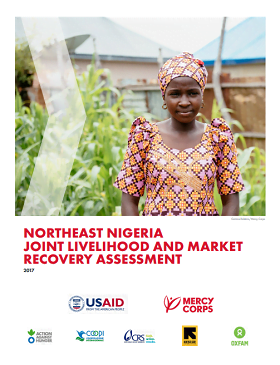
Northeast Nigeria joint livelihoods and market recovery assessment
Report
Mercy Corps Nigeria, in conjunction with Action Against Hunger, Cooperazione Internazionale, Catholic Relief Services, the International Rescue Committee and Oxfam undertook the assessment across the three most affected states in Northeast Nigeria; Adamawa, Borno and Yobe, to better understand...
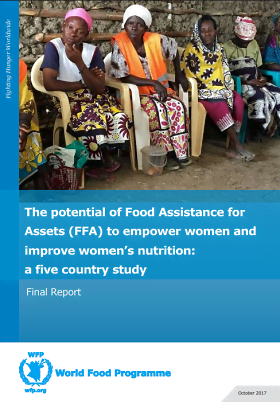
The Potential of Food Assistance for Assets (FFA) to Empower Women and Improve Women’s Nutrition: a five country study
Report
From June 2016 to April 2017, a five-country study to explore the potential of WFP’s Food Assistance for Assets (FFA) programmes to empower women and improve women’s nutrition was conducted by WFP. The purpose of the study was to: 1. Assess changes (outcomes or impacts) that relate to women’s...

Electronic Transfers in Humanitarian Assistance and Uptake of Financial Services
Report
The Electronic Cash Transfer Learning Action Network (ELAN) undertook case studies on humanitarian electronic transfer (‘e-transfer’) projects in Ethiopia, Zimbabwe and Bangladesh. The case studies examine the extent to which: recipients used digital financial services (e.g. money transfers, savings,...
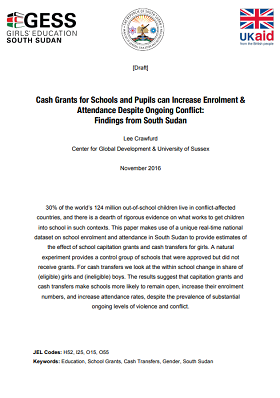
Cash Grants for Schools and Pupils can Increase Enrolment & Attendance Despite Ongoing Conflict: Findings from South Sudan
Report
This paper makes use of a unique, real-time national dataset on school enrolment and attendance in South Sudan to provide estimates of the effect of school capitation grants and cash transfers for girls.

Policy Briefing: Electronic Transfers in Humanitarian Assistance and Uptake of Financial Services
Report
The Electronic Cash Transfer Learning Action Network (ELAN) undertook case studies on humanitarian electronic transfer (‘e-transfer’) projects in Ethiopia, Zimbabwe and Bangladesh. The case studies examine the extent to which: recipients used digital financial services (e.g. money transfers, savings,...
The effect of financial aid from UK Aid Girls’ Education South Sudan programme and EU IMPACT programme to education in South Sudan in 2017
Report
This paper is an update to the previous Girls’ Education South Sudan working paper that looked at the effect of financial interventions (capitation grants and girl’s cash transfers) by Girls’ Education South Sudan, a collaboration of UK Aid and the Ministry of General Education and Instruction,...
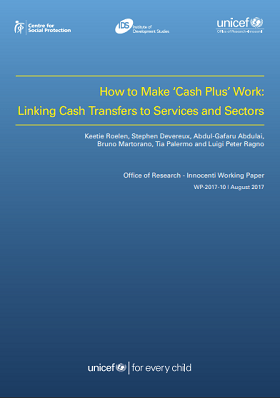
How to Make ‘Cash Plus’ Work: Linking Cash Transfers to Services and Sectors
Report
The broad-ranging benefits of cash transfers are now widely recognized. However, the evidence base highlights that they often fall short in achieving longer-term and second-order impacts related to nutrition, learning outcomes and morbidity.In recognition of these limitations, several ‘cash...

Cash for Education: A global review of UNHCR programmes in refugee settings
Report
This review provides an overview of the use of cash assistance in 45 cash-related education programmes in 21 UNHCR operations. It highlights the key opportunities and challenges with the use of cash for education and provides key direction for future programming and related protection considerations....

Humanitarian Cash Transfers in the Democratic Republic of the Congo: Evidence from UNICEF’s ARCC II Programme
Report
From March 2013 to September 2015, UNICEF and three partner organizations (Concern Worldwide, Mercy Corps, and Solidarités International), collaborated to deliver what was at the time the single-largest unconditional cash transfer programme for humanitarian response in the Democratic Republic of the...

Can Conditional Cash Transfers improve the uptake of nutrition interventions and household food security? Evidence from Odisha’s Mamata scheme
Report
There is considerable global evidence on the effectiveness of cash transfers in improving health and nutrition outcomes; however, the evidence from South Asia, particularly India, is limited. In the context of India where more than a third of children are undernourished, and where there is considerable...
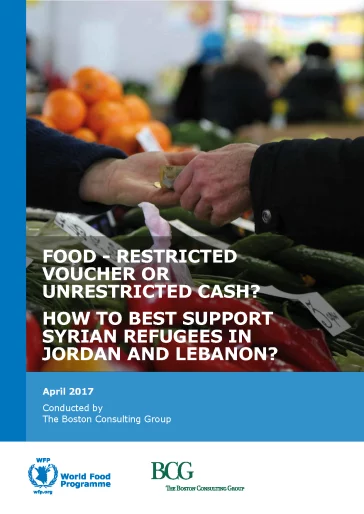
Food – Restricted Voucher or Unrestricted Voucher Cash? How to Best Support Syrian Refugees in Jordan and Lebanon?
Report
The World Food Programme (WFP) plays a pivotal role in the food security of Syrian refugees within the Syria +5 region. WFP periodically reviews its operational approach, so it is timely to consider what the best modality for the next phase of the response might be, including the pros and cons of...

Shock-Responsive Social Protection Systems Research Case Study: Pakistan
Report
This case study presents an overview of the social protection disaster risk management and humanitarian systems in Pakistan, and discusses both Pakistan’s flagship social protection programme, the Benazir Income Support Programme (BISP), as well as emergency cash transfers provided as disaster...
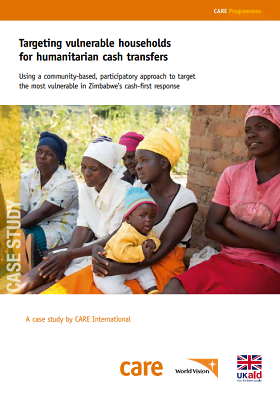
Targeting vulnerable households for humanitarian cash transfers: using a community based, participatory approach to target the most vulnerable in Zimbabwe’s cash-first response
Report
Over 73,000 drought affected households across 15 districts in Zimbabwe received monthly multi-purpose, unconditional cash transfers. With such a large caseload over a wide area, 100% verification of the households would not have been the most resource efficient approach. Moreover, there would have been a...

Community Based Targeting Report
Report
The current study aimed to gain a comprehensive understanding of SEV from the community’s perspective and to assess the targeting practices implemented by cash actors in Lebanon. It demonstrated that, according to the community, HH size had an impact on vulnerability, but that that depended on its...
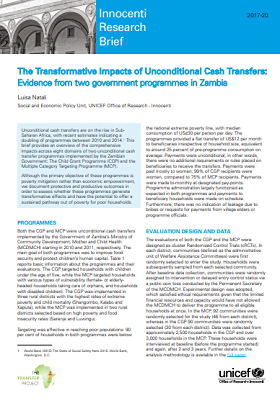
The Transformative Impacts of Unconditional Cash Transfers: Evidence from two government programmes in Zambia
Report
Unconditional cash transfers are on the rise in Sub-Saharan Africa, with recent estimates indicating a doubling of programmes between 2010 and 2014.This brief provides an overview of the comprehensive
impacts across eight domains of two unconditional cash transfer programmes implemented by the...

The Livelihood Impacts of Cash Transfers in Sub-Saharan Africa: Beneficiary Perspectives from Six Countries
Report
Cash transfers (CTs) are a social protection mechanism to reduce the poorest households’ vulnerability to shocks and build human
capital by smoothing consumption and sustaining expenditure on education and social welfare.
This study examines whether and how CTs go beyond welfare objectives to promote...

2016/7 Winter Inter-Agency PDM Report
Report
Between August 2016 and March 2017, fourteen organizations provided more than 140,000 Syrian refugee households in Turkey with assistance to stay warm through the harsh winter season. Organizations delivered winter support to refugees in 52 of Turkey’s 81 provinces, primarily through restricted and...
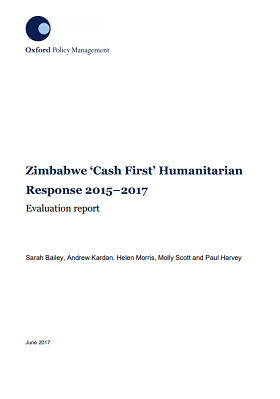
Zimbabwe ‘Cash First’ Humanitarian Response 2015–2017: Evaluation Report
Report
CARE International and World Vision International (WVI) in Zimbabwe implemented the UK Department for International Development (DFID)-funded project ‘Emergency Cash First Response to Drought-Affected Communities in the Southern Provinces of Zimbabwe’ from August 2015 to April 2017. The project...

Scaling-up CTP in Somalia: Reflecting on the 2017 Drought Response
Report
This report summarises discussions that took place during a half-day workshop in September 2017. It built on issues identified as needing action in May, as outlined in the ‘Looking back to move forward: Building on learning from 2011 to strengthen the 2017 drought response in Somalia learning report’.
